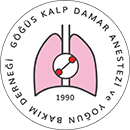

The Prognostic Power of Albumin: A Key to Mortality Prediction in Open-heart Surgery
Burak Toprak1, Çise Kanat Toprak21Department of Cardiovascular Surgery, Mersin Şehir Training and Research Hospital, Mersin, Türkiye2Department of Child and Adolescent Psychiatry, Mersin University Faculty of Medicine Hospital, Mersin, Türkiye
Objectives: This study aims to evaluate the impact of preoperative and postoperative albumin levels on mortality in open-heart surgery patients, investigating albumin as a predictive biomarker. Identifying such markers could improve perioperative management by enabling early risk stratification and personalized postoperative care for high-risk individuals.
Methods: A retrospective analysis was conducted on patients undergoing open-heart surgery at Mersin University Faculty of Medicine between February 2021 and December 2022. Data collected included demographic information, comorbidities, and biochemical markers such as albumin, urea, creatinine, and inflammatory markers. Multivariate logistic regression was used to analyze the relationship between albumin levels and mortality, adjusting for potential confounders.
Results: Among 450 patients, those with lower albumin levels pre- and post-surgery had a significantly higher risk of mortality. Elevated postoperative creatinine and urea, along with increased inflammatory markers, were also associated with worse outcomes. These findings suggest that hypoalbuminemia contributes to fluid imbalance and delayed healing, increasing mortality risk in open-heart surgery patients.
Conclusion: Hypoalbuminemia, both preoperatively and postoperatively, is a strong predictor of mortality in open-heart surgery patients. Regular monitoring of albumin levels may reduce complications and improve survival rates. Albumin serves as a cost-effective biomarker for guiding personalized perioperative care, potentially improving outcomes in high-risk surgical patients.
Makale Dili: İngilizce
(20 kere indirildi)

















